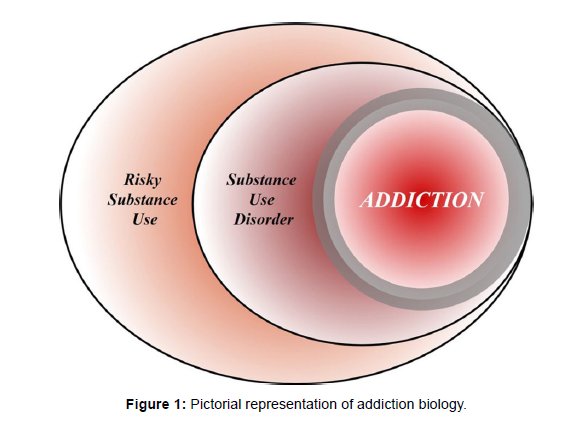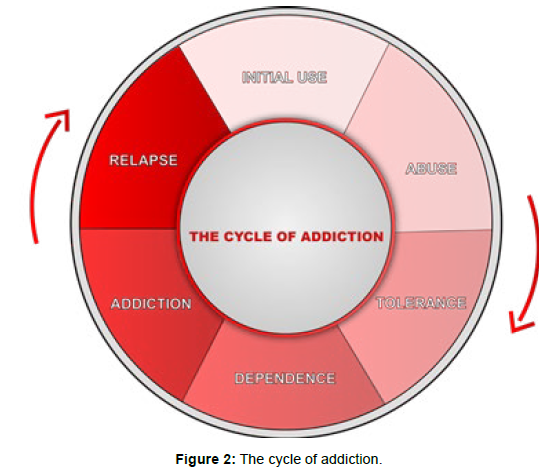Addiction Opioids and Reward: An Encounter of Psychology, Medicine and Biology
Received: 01-Apr-2023 / Manuscript No. jart-23-92622 / Editor assigned: 04-Apr-2023 / PreQC No. jart-23-92622 (PQ) / Reviewed: 18-Apr-2023 / QC No. jart-23-92622 / Revised: 20-Apr-2023 / Manuscript No. jart-23-92622 (R) / Accepted Date: 22-Apr-2023 / Published Date: 27-Apr-2023
Abstract
Addiction is a complex disorder that involves both genetic and environmental factors. Addiction biology is an important field of study that seeks to understand the biological and genetic mechanisms underlying addiction. Through a variety of research methods and techniques, addiction biology has identified specific brain circuits and neurotransmitters that are involved in the development of addiction. It has also identified genetic and environmental risk factors that increase an individual's susceptibility to addiction. Despite the significant progress that has been made in addiction biology research, there are still many unanswered questions and challenges in the field. Further research is needed to better understand the complex interactions between genes and environment that contribute to addiction susceptibility. Additionally, more effective treatments for addiction are needed to address this significant public health problem. Overall, addiction biology is an important field of study that has the potential to make significant contributions to our understanding of addiction and to the development of more effective treatments for this complex disorder.
Keywords
Addiction; Biology; Medicine; Opioids
Introduction
Addiction biology is a field of study that focuses on the biological and genetic factors that contribute to the development and maintenance of addiction. It examines the changes that occur in the brain and body as a result of chronic drug use, and the underlying neural mechanisms that drive addictive behaviours [1].
Addiction is a complex and multifaceted disorder that affects individuals differently. It is characterized by compulsive drug-seeking and drug-taking behaviours, despite negative consequences, and a loss of control over drug use. Addiction can also lead to tolerance, withdrawal, and relapse [2].
Research in addiction biology has revealed that addiction involves changes in the brain's reward circuitry, which is responsible for regulating feelings of pleasure and motivation. Specifically, chronic drug use can alter the function of neurotransmitters, such as dopamine and serotonin, which play a critical role in the brain's reward system [3] (Figure 1).
Moreover, genetic factors have been shown to play a role in addiction susceptibility, with certain individuals being more vulnerable to developing addiction than others. Environmental factors, such as stress and trauma, can also contribute to addiction [4].
Methodology
Addiction biology uses a variety of research methods and techniques to investigate the biological and genetic mechanisms underlying addiction. Here are some of the commonly used methodologies:
Animal models
Researchers use animal models, such as rats and mice, to study the effects of drugs on the brain and behavior. Animal models allow researchers to control for variables and manipulate different factors to better understand the underlying mechanisms of addiction [5].
Neuroimaging
Neuroimaging techniques, such as functional magnetic resonance imaging (fMRI) and positron emission tomography (PET), are used to study brain activity in individuals with addiction. These techniques can help researchers identify changes in the brain's reward circuitry and understand how drugs affect brain function [6].
Genetics
Genetic studies are used to identify genetic variants associated with addiction susceptibility. Researchers use techniques such as genomewide association studies (GWAS) and whole-genome sequencing to identify genetic risk factors for addiction [7].
Epigenetics
Epigenetic studies examine the changes in gene expression that occur as a result of drug use. Researchers use techniques such as DNA methylation analysis to identify changes in gene expression that may contribute to addiction [8].
Pharmacology
Pharmacological studies examine the effects of drugs on the brain and behavior. Researchers use techniques such as drug administration and receptor binding assays to better understand the mechanisms of drug action [9] (Figure 2).
Behavioral assays
Behavioral assays are used to study addiction-related behaviors in animals and humans. Researchers use techniques such as selfadministration assays and conditioned place preference assays to measure drug-seeking and drug-taking behaviour [10].
Addiction Biology Types
There are different types of addiction biology that focus on specific aspects of addiction. Here are some of the main types:
Molecular addiction biology
This type of addiction biology focuses on the molecular and cellular changes that occur in the brain as a result of drug use. It examines how drugs interact with the brain's neurotransmitters and receptors, and how these interactions lead to changes in brain function [11].
Behavioral addiction biology
This type of addiction biology focuses on non-substance-related behaviors that can become addictive, such as gambling, gaming, or shopping. It examines the brain mechanisms underlying these behaviors and how they can become addictive [12].
Epigenetic addiction biology
This type of addiction biology focuses on changes in gene expression that occur as a result of drug use. It examines how drugs can modify gene expression through epigenetic mechanisms and how these changes can lead to addiction [13].
Pharmacogenetics addiction biology
This type of addiction biology focuses on the genetic factors that affect an individual's response to drugs. It examines how genetic variants can influence drug metabolism and sensitivity, and how this can contribute to addiction susceptibility [14].
Neuroimaging addiction biology: This type of addiction biology uses neuroimaging techniques to study the brain changes that occur in individuals with addiction. It examines how drugs affect brain structure and function, and how this can lead to addictive behaviors [15].
Discussion
Addiction biology is an important field of study that has greatly contributed to our understanding of addiction. By investigating the biological and genetic mechanisms underlying addiction, researchers have been able to identify key brain pathways and neurochemical changes that contribute to the development and maintenance of addiction.
One of the major findings of addiction biology research is that addiction is a complex and multifaceted disorder that involves both genetic and environmental factors. Genetic studies have identified several genetic variants that increase an individual's susceptibility to addiction, while environmental factors such as stress and trauma can also increase the risk of addiction.
Moreover, addiction biology research has identified specific brain circuits and neurotransmitters that are involved in the development of addiction. Chronic drug use can alter the function of these circuits, leading to changes in motivation, reward, and decision-making processes that contribute to the compulsive drug-seeking and drugtaking behaviors observed in addiction.
Despite these significant findings, there are still many unanswered questions in addiction biology. For example, it is unclear why some individuals develop addiction while others do not, even when exposed to similar environmental and genetic risk factors. Additionally, while there have been some promising pharmacological treatments for addiction developed based on addiction biology research, there is still a great need for more effective treatments for this complex disorder.
Conclusion
In conclusion, addiction biology is an important field of study that seeks to understand the biological and genetic mechanisms underlying addiction. Through a variety of research methods and techniques, addiction biology has identified specific brain circuits and neurotransmitters that are involved in the development of addiction. It has also identified genetic and environmental risk factors that increase an individual's susceptibility to addiction.
Despite the significant progress that has been made in addiction biology research, there are still many unanswered questions and challenges in the field. Further research is needed to better understand the complex interactions between genes and environment that contribute to addiction susceptibility. Additionally, more effective treatments for addiction are needed to address this significant public health problem.
References
- Tebes J, Irish T, Puglisi VMJ, Perkins DV (2004) Cognitive transformation as a marker of resilience.Substan Use Misuse39: 769-788.
- Ntoumanis N, Healy LC, Sedikides C, Duda J, Stewart B, et al. (2014) When the Going Gets Tough: The “Why” of Goal Striving Matters. J Personality 82: 225-236.
- Elkington R, Breen JM (2015) How senior leaders develop resilience in adversity: A qualitative study. J Leadership, Accountability Ethics 12: 93-110.
- Burns JM (2004) Transforming Leadership. Grove Press, USA.
- George B, Bennis W (2003) Authentic Leadership: Rediscovering the Secrets to Creating Lasting Value. John Wiley & Sons, USA.
- Bass BM, Riggio RE (2006) Transformational leadership. Psychology press United Kingdom.
- O’Brien CP, Greenstein R, Woody GE (1978) Update on naltrexone treatment. NIDA Res Monogr 19: 315-320.
- Mysels DJ, Cheng WY, Nunes EV, Sullivan MA (2010) The association between naltrexone treatment and symptoms of depression in opioid-dependent patients. Am J Drug Alcohol Abuse 37: 22-26.
- Spooner C, Kate Hetherington K (2004) Social determinants of drug use. National drug and alcohol research centre, University of New South Wales, Sydney, USA.
- Hollister LE, Johnson K, Boukhabza D, Gillespie HK (1981) Aversive effects of naltrexone in subjects not dependent on opiates. Drug Alcohol Depend 8: 37-41.
- Gowing L, Ali R, White JM (2009) Buprenorphine for the management of opioid withdrawal. Cochrane Database Syst Rev 8:CD002025.
- Darke S, Ross J (1997) Polydrug dependence and psychiatric comorbidity among heroin injectors. Drug Alcohol Depend 48:135-141.
- Hamilton M (1960) A rating scale for depression. J Neurol Neurosurg Psychiatry 23:56-62.
- Crowley TJ, Wagner JE, Zerbe G, Macdonald M (1985) Naltrexone-induced dysphoria in former opioid addicts. Am J Psychiatry142:1081-1084.
- Almatroudi A, Husbands SM, Bailey CP, Bailey SJ (2015) Combined administration of buprenorphine and naltrexone produces antidepressant-like effects in mice. J Psychopharmacol 29:812-821.
Indexed at, Google Scholar, Crossref
Indexed at, Google Scholar, Crossref
Indexed at, Google Scholar, Crossref
Indexed at, Google Scholar, Crossref
Indexed at, Google Scholar, Crossref
Indexed at, Google Scholar, Crossref
Indexed at, Google Scholar, Crossref
Indexed at, Google Scholar, Crossref
Citation: Warner M, Thobiasis J (2023) Addiction Opioids and Reward: AnEncounter of Psychology, Medicine and Biology. J Addict Res Ther 14: 523.
Copyright: © 2023 Warner M. This is an open-access article distributed under theterms of the Creative Commons Attribution License, which permits unrestricteduse, distribution, and reproduction in any medium, provided the original author andsource are credited.
Select your language of interest to view the total content in your interested language
Share This Article
Recommended Journals
Open Access Journals
Article Usage
- Total views: 1289
- [From(publication date): 0-2023 - Oct 15, 2025]
- Breakdown by view type
- HTML page views: 993
- PDF downloads: 296


